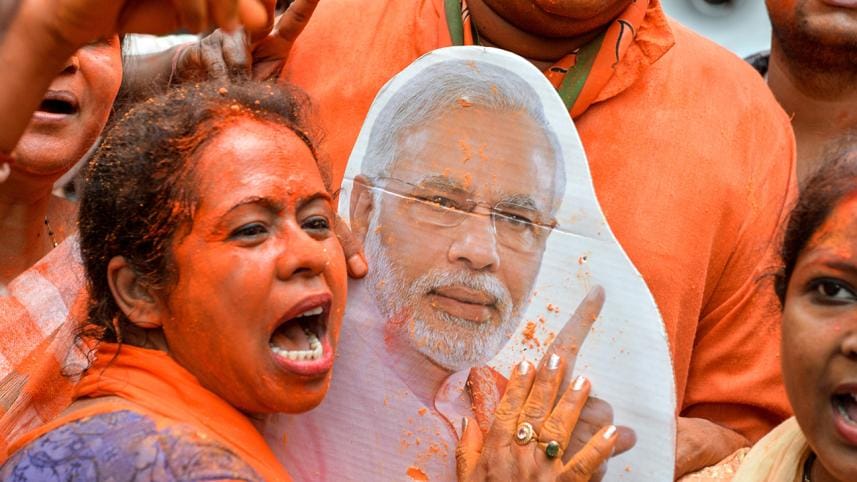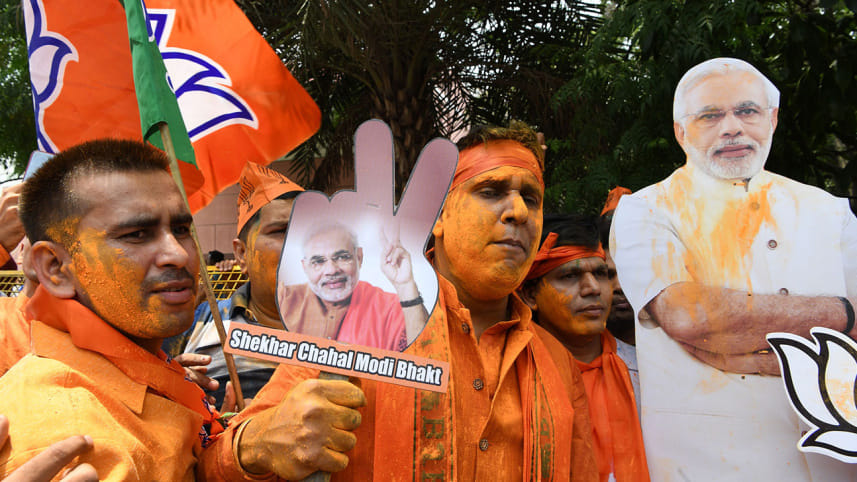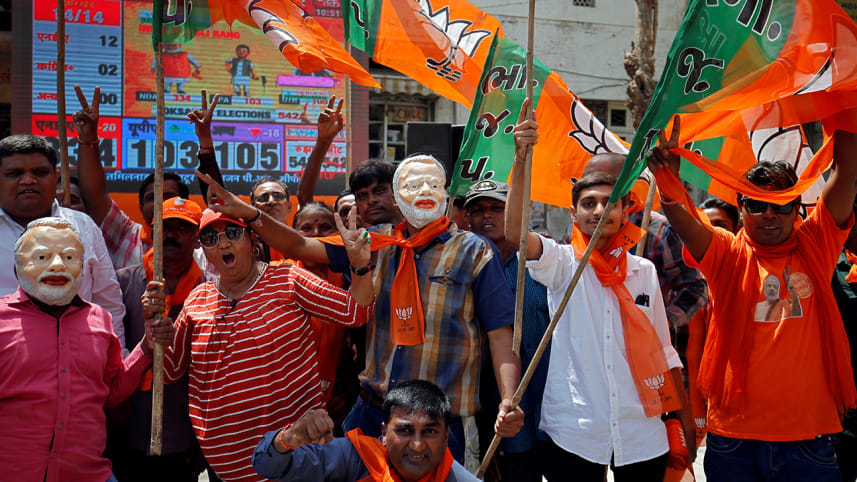Modi wins Indian election in landslide

Riding on the crest of an unprecedented Modi surge across most parts of India, Prime Minister Narendra Modi-led Bharatiya Janata Party today stormed back to power to rule India for five more years with a historic mandate in parliamentary elections that saw a saffron sweep bigger than the party got five years ago.
Modi, whose main poll plank was national security and Hindutva, was himself leading in Varanasi constituency in Uttar Pradesh with a margin of over 4.3 lakh votes while his close aide and BJP President Amit Shah in Gandhinagar in their home state of Gujarat won by over 5.5 lakh votes.
By contrast, Congress President Rahul Gandhi trailed behind BJP candidate Smriti Irani in Amethi constituency in a direct contest in the Gandhi family bastion. However, Rahul was leading in another constituency Wayanad in Kerala.

As per the latest trends of the vote-count until final official results which are expected late on Thursday night after VVPAT paper trails are tallied with EVM votes in specified polling stations in each constituency, the BJP has won or led in 299 seats and its allies in 50 seats taking their total to 342, a bigger mandate than the one they got in the previous national poll in 2014.
This means the BJP has won on its own once again securing majority in the second such instance since 1984 when the Congress led by Rajiv Gandhi had got three-fourth majority riding on the sympathy wave sparked by Indira Gandhi's assassination.
In the previous national poll, the BJP had got majority with 282 seats, the first time a party has won single handedly in three decades, and its NDA allies 54 seats with a total of 336 seats.

Principal opposition Congress-led United Progressive Alliance trailed far behind with 95 seats with Congress alone winning or leading in only 50 seats.
A clutch of regional parties like Biju Janata Dal, Trinamool Congress, Y S R Congress Party and Telangana Rashtra Samithi which are neither in NDA nor in UPA camp, are set to get 109 seats, according to trends released by the Election Commission for all 542 seats that went to polls in seven phases between April 11 and May 19.
An estimated 600 million out of total 900 million voters exercised their franchise in this year's national elections.
Stock markets cheered the results, as the benchmark sensex touched 40,000 for the first time while the value of Indian Rupee vis-a-vis US Dollar went up by 14 paise to 69.51.
Several ministerial colleagues of Modi, who single-handedly fronted the BJP and NDA campaign, congratulated the Prime Minister as celebrations broke outside BJP offices across India with the supporters beating drums, dancing and distributing sweets.
The results are a ringing endorsement of Prime Minister Narendra Modi's popularity, his government's achievements in the last five years and his campaign, which centred around national security, nationalism and Hidutva. He also relentlessly attacked the Congress for what he called its dynastic legacy and blamed it for the country's woes. The opposition had criticised the BJP campaign as divisive and polarizing.
In his first comments on the election outcome Modi, considered by his critics as a polarizing figure, promised to build an inclusive India even as his close aide and BJP president Amit Shah described the party's poll verdict as the people's mandate against "the opposition's propaganda and personal attacks as well as their total rejection of politics of dynasty, appeasement and casteism.
Within three hours after the start of vote-count at 8:00am Indian time, it became crystal clear that the BJP led in as many as 292 seats, ten more than it won in 2014 and that the BJP-led NDA would cross 300 seats in the 543-member Lok Sabha, something almost all exit polls and Modi himself had predicted after the last votes were cast on May 19.
Modi will become the first non-Congress Prime Minister to return to power after a full five-year term. In 2014, Narendra Modi's BJP became the first party since Rajiv Gandhi's Congress in 1984 to win a full majority on its own. This remarkable feat has been powered by a surge in the BJP's vote-share cutting across geographical regions, caste, age, gender and economic divides.
At the heart of the BJP's landmark performance in this year's elections lies its success in holding on to its dominance of 2014 poll in Hindi heartland states of Uttar Pradesh and Chhatttisgarh and the total sweep in Rajasthan and Madhya Pradesh, which together account for 145 seats and its stunning gains in West Bengal where the saffron party led in 20 constituencies, a gain of 18 over just two in 2014 election in the state. Trinamool Congress was just ahead with lead in 22 states in West Bengal.
In Bihar, the BJP and its allies also led in 37 out of total 39 seats while the saffron party and its ally Shiv Sena were ahead in 41 out of total 48 seats in Maharashtra, the second biggest state electorally after UP.

In the electorally most crucial state of Uttar Pradesh, where the Samajwadi Party-Bahujan Samaj Party combine had posed a stiff challenge to the BJP, the saffron outfit led in 56 of the 80 seats at stake. The SP was ahead in eight and BSP in 12. Although the BJP had won 72 seats in the last elections, the performance is much better than what many exit polls had forecast this time.
In a major blow to Priyanka Vadra Gandhi who plunged into the party as its General Secretary just in January this year, the Congress was ahead only in one seat in Uttar Pradesh. Even Congress President Rahul Gandhi trailed behind BJP's Smriti Irani in Amethi but was clearly ahead in Wyanad, the second constituency he is fighting this time, in Kerala.
The Modi wave not only swept through the Hindi heartland, Delhi and Gujarat, as was expected, but also West Bengal, Odisha, Maharashtra and Karnataka. The southern states of Kerala, Tamil Nadu, Andhra Pradesh and Telangana remained untouched by the saffron tsunami.
The BJP also led in all the seven parliamentary constituencies in the Indian capital, repeating its performance of 2014.
The southern state of Andhra Pradesh has given a sweeping mandate to YSR Jaganmohan Reddy in the assembly and parliamentary polls, decimating Chief Minister N Chandrababu Naidu's Telugu Desam Party. Jaganmohan Reddy, the chief of the Y S R Congress, is leading in 141 of the state's total of 175 assembly seats and all 25 of its Lok Sabha seats.
Jaganmohan,46, is the son of YS Rajashekhara Reddy, former Congress leader and one of the state's most popular Chief Ministers who died in a helicopter crash in 2009. After the death of his father, Jaganmohan formed Y S R Congress in 2011.
The Bijju Janata Dal retained its hold over Odisha, having won 106 out of total 147 seats in the state assembly.



 For all latest news, follow The Daily Star's Google News channel.
For all latest news, follow The Daily Star's Google News channel.
Comments